- Home
- Beverly Barton
Navajo's Woman Page 2
Navajo's Woman Read online
Page 2
Russ shut off the radio and increased the speed of the truck. "Hell! I knew the police would think I did it. With my record of trouble making and my father's reputation ruined because your uncle Joe ratted on him, I'm as good as dead."
"The police just want us for questioning," Eddie said.
"I think we should go back, turn ourselves in and tell them what happened."
"Do you honestly think they're going to believe us?"
"They might."
"Yeah, well, even if they do—and I don't think they will—what about the guy who really killed Bobby? He won't have any trouble killing both of us to keep us quiet."
"Jewel can back up your story. She went in at Bobby's with you."
"Jewel was so scared that she ran, didn't she? She didn't hang around to see if we got out okay. She's not going to want to get involved. She could easily deny having seen or heard anything, just to cover her own butt."
As much as Eddie hated to admit that Russ was right, he nodded his head in agreement. Being on the run from the police and from a ruthless killer wasn't what Eddie wanted. But what choice did he have? He couldn't turn against his best friend, could he?
"We're in this together, right?" Russ cut Eddie a sideways glance.
"Yeah. Right."
Joe Ornelas popped the caps off six bottles, placed the open beer on a tray and carried the refreshments out from behind the bar that separated his compact kitchen from his combination dining and living room. Hunter Whitelaw and Jack Parker still sat at the table where they'd been playing cards. Matt O'Brien picked up the TV remote and said something about checking ball scores on ESPN. Wolfe stood by the windows, his back to the rest of the Dundee agents, as he stared out into the rainy Atlanta night. Ellen Denby, their boss lady, came toward Joe, smiling.
"Need some help?" she asked.
"Just help yourself," he replied, holding the tray out to her. "What's up with Wolfe?" Joe nodded toward the solitary figure by the double windows that overlooked Salle Street. "This is the first time he's taken me up on my offer to play cards. I had begun to think he was avoiding our company."
Ellen lifted a bottle from the tray. "He knows all of us a little better than he did a few months ago. I think working closely with you and Hunter on rescuing Egan Cassidy's kid might have helped." Ellen glanced over her shoulder at Wolfe, who seemed preoccupied with his own thoughts. "He's a loner if I ever saw one."
"Where's that beer?" Hunter threw up his hand and motioned to Joe to come to him. "While you're making brownie points with the boss, I'm dying of thirst." Hunter laughed. Long, low, deep, grunting chuckles.
As Joe passed the sofa where Matt sat engrossed in the sportscast, Joe handed him a beer, then headed toward the table. He placed the tray in the center, which only five minutes earlier had held the night's winnings. After Jack and Hunter grabbed their beverages, Joe picked up the two remaining bottles and walked toward the man who had separated himself from the others.
“Beer?'' Joe held up a bottle in offering.
Wolfe turned slowly, nodded, accepted the beer and said, "Thanks."
"I'm glad you decided to join us tonight," Joe told him.
"I appreciate your asking me." Wolfe lifted the bottle to his lips and downed a hefty swig.
“Feel free to join us anytime. The players change, depending on who's in town, and we rotate apartments. Next week, it's Ellen's turn."
"Uh-huh."
Joe had thought himself a man of few words, but compared to Wolfe he was a regular chatterbox. The others had speculated about the reclusive agent, who'd been with Dundee's Private Security and Investigation less than a year. Unlike the rest of them, who'd been hired by Ellen, Wolfe held the distinction of having been chosen by the owner of the agency, Sam Dundee. No one knew anything about Wolfe—not even Ellen. But she had quickly ascertained that the man had undeniable abilities. He was not only an expert marksman, but he had a knowledge of every aspect of the business, from weapons to strategy, from equipment to psychology.
"Damn!" Matt jumped up from the sofa. "I just lost fifty bucks on the Braves game."
"That's what you get for gambling," Ellen said.
"Look who's talking," Matt told her. "You lost thirty dollars tonight playing cards. Hell, add the fifty I lost on the ball game to the forty-five I lost here and I'm nearly a hundred dollars poorer."
"We had no idea what an expert card player Wolfe was," Hunter said. "He took us all to the cleaners."
"Are you sure you've never been a professional?" Matt asked, looking directly at Wolfe.
Wolfe shook his head. "No."
"Ah, the guy's just good at cards, the way he is at everything else." Hunter rose from his chair to his full six-four height.
Joe noted a pained expression on Wolfe's face, as if Hunter's comment had somehow hurt him. But surely, no one would be hurt by a sincere compliment, would they?
"I should be going." Wolfe placed his half-empty bottle down on the tray atop the table.
"Yeah, me, too." Matt downed the last drops of his beer, then tossed the empty bottle to Joe, who caught it effortlessly in his left hand while continuing to hold his own bottle in his right.
"Yeah, it's about time I called it a night," Jack Parker said in his deep, Texas drawl, then scooted back his chair and got up.
The telephone rang just as Wolfe opened the apartment door. Not looking back, he made a hasty exit. Jack Parker waved goodbye and followed Wolfe. Matt lingered in the doorway.
"Need a ride home, Denby?" He smiled, showing a set of movie-star teeth.
"You know Hunter's taking me home," she replied.
"Yeah, I know, but you can't shoot a guy for trying."
"Our Ellen can and would shoot you." Hunter chuckled.
"You guys hold it down," Joe told them as he lifted the telephone receiver. "Yeah, Ornelas here."
"Matt, you can give up trying," Ellen said, smiling. "I don't date Dundee employees."
"So how come Hunter can escort you around and I can't?" Matt leaned against the door.
Joe covered the receiver with his hand, gave his companions a stern look and repeated, "Hold it down. I can't hear what my sister's saying."
"Because Hunter is a gentleman and you're not," Ellen said softly, then nodded and waved to Joe, letting him know that she'd heard him, understood and would be quiet now.
Joe removed his hand from the mouthpiece. "Sorry about that, Kate, but I've got a few friends over tonight."
"You must come home, Joseph." Kate's voice held an edge of near hysteria and it wasn't normal for his sweet, easygoing sister to be this upset.
"What's wrong?"
"It's Eddie. He's in big trouble. We need you very badly."
"What kind of trouble is Eddie in?"
"Trouble with the—" Kate's voice broke "—the police." She sighed. "He and Russ Lapahie are wanted for questioning in the murder of Bobby Yazzi, a man who is known for selling drugs to our children."
Joe's heartbeat accelerated. Eddie was in trouble with the police? He couldn't imagine anything so ridiculous. Not a good kid like his eldest nephew, who was a bright student, an obedient son and a hard worker, helping his father on the ranch since he'd been not much more than a toddler.
"You said that Eddie is wanted by the police. Where is he now? Why hasn't he turned himself in?"
"We don't know where he is. Eddie and Russ are both missing. They've run away—"
Kate whimpered, and Joe knew she was struggling with her emotions, trying to not break down and cry.
"Andi says that their running makes them look guilty," Kate said.
"Andi's good at finding people guilty." The mention of Andi's name struck a disharmonious chord in Joe. He had spent five years trying to forget about the past, trying to put Andrea Stephens out of his mind.
"No, you misunderstand," Kate told him. "Andi doesn't think the boys are guilty. She knows they aren't capable of murder. She simply pointed out what is so obvious—that b
y running, Eddie and Russ have only made matters worse for themselves."
Ellen laid a hand on Joe's shoulder and whispered, "Is there anything we can do?"
"Hold on, Kate." Joe turned to Ellen. "Yeah. I'm going to need some time off. I have to go home. My nephew's in trouble."
"Take all the time you need," Ellen said. "If I or the agency can help, all you have to do is call me."
"Thanks."
"We'll let ourselves out." Hunter escorted Ellen to the open door, and they and Matt waved good-night, then closed the door behind them.
"I'll take the first flight I can get. The Dundee jet isn't available right now. I'll call you back when I've made arrangements."
"Ed and I will meet your plane."
"Be brave."
"Yes, I am trying."
Joe replaced the receiver when the dial tone hummed in his ear. He and Kate had been as close as a brother and sister could be. He was the younger sibling, but only two years separated them in age. She had married Ed Whitehorn when she was twenty and had given birth to her first child at twenty-one. The entire family had adored Eddie, such a beautiful, clever child. Until Joe had resigned from the Navajo Tribal police force and left his home in New Mexico five years ago, he and his nephew had been the best of buddies. And even now, the two spoke often on the phone. He simply could not imagine how a good boy like Eddie could be involved in anyone's murder, even as a witness. Unless he'd been in the wrong place at the wrong time. But why would Eddie have been anywhere near a known drug dealer? And why had the boy run away?
Russ Lapahie was the answer to all Joe's questions. J.T. had told him that Russell's son had been in and out of trouble ever since Russell's death. Trouble at school, trouble at home and trouble with the law.
"Doli can't do anything with him," J.T. had said. "And he won't listen to Andi, either. They're both 'just women,' as far as Russ is concerned."
Joe grunted. To think that he had been the one to advise Ed and Kate not to forbid Eddie to hang out with Russ. He had mistakenly hoped that his nephew would be a good influence on Andi's brother. Now, it looked as if he'd been wrong. The opposite had happened.
He couldn't deny that his bad advice had been prompted partly out of guilt. After all, if Joe had looked the other way and kept his mouth shut five years ago, when he had discovered Russell Sr. was covering up his brother-in-law's livestock smuggling ring, his former police captain would still be alive. And Russ and Andi would still have their father. The way Joe figured it, he not only had to go home to help Eddie, but to help Russell's son, too.
"I want those boys found!" The dark hand that slammed down on the desk bore several crisscrossed scars, reminders of a long-ago knife fight. A fight he had won. Three diamond rings sparkled on various fingers, each catching the light from the green-shaded lamp to his right.
LeCroy Lanza glowered at his subordinates, both men killers by instinct and training. In his line of work, it didn't pay to send out a boy to do a man's job. He wanted Russ Lapahie and Eddie Whitehorn found and taken care of so that neither boy could identify him. He'd seen Russ's face and had laughed silently at the boy's wide-eyed shock after he'd witnessed the murder. He had seen the shadow of another person behind Russ, but LeCroy hadn't been able to make out much. At the time, he'd thought the second kid was female. Apparently, it had been Eddie.
In retrospect, he realized that he should have sent someone else to take care of Bobby Yazzi, the two-timing little son of a bitch. But LeCroy Lanza had a reputation to uphold. He was known for taking care of his problems personally. And Bobby had become a major problem. Who had he thought he was—lying and cheating, stealing from the man who'd set him up in business? Nobody cheated LeCroy Lanza and lived.
"Charlie, you find out where those boys went. Hire some trackers, if necessary. I'll call in a few favors and see if I can get any information that might help us." LeCroy gripped Charlie Kirk's shoulder. "I want those boys dead before they have a chance to talk to the police."
Chapter 2
Joe hadn't been home in five years, although his job as a Dundee agent had brought him out west a couple of times. When he'd left the reservation three weeks after Russell Lapahie's suicide, he'd gone straight to Atlanta and had begun working for the Dundee agency. A couple of times his sister Kate and her family had come to Georgia to visit, and he kept in contact weekly by phone. And he and his cousin J. T. Blackwood e-mailed each other on a regular basis and spoke on the phone from time to time. Otherwise, he had cut himself off from his past, from his people and from his heritage.
Did he ever miss his old life? Did a part of him still long to truly be one of the Dine? Yeah, sure, in those dark, lonely moments when he had allowed himself to remember, he'd longed to see the Dinehtah. The land of the Navajo. He had been born here in New Mexico, on the reservation, and had grown to manhood within the closely knit family of his mother's clan, just outside the town of Castle Springs. He had been proud of his heritage and honored to become a member of the Navajo Tribal Police. Once, Joe had thought of himself as a good guy, a role model for other Navajo youths, and at times, even a hero. But his days of being a hero, in anyone's eyes, including his own, died along with Russell Lapahie.
His devotion to his family and his people had been the driving factor in his life, but all of that had ended the day Russell committed suicide. His friends, acquaintances and fellow officers seemed to forget that Russell had been the one who had betrayed his trusted position on the police force. That Russell had been the one who had committed a crime. During the worst of the maelstrom that infected their lives from the moment he arrested his captain until after Russell's funeral, Joe had begun to doubt himself. Had he been wrong to reveal the crime and arrest the culprit because that man had been his friend and a superior officer? A lot of people seemed to think so. Including Andi, Russell's daughter. She had turned on Joe with a vengeance.
If she had stood by him, supported him, believed in him, would he have stayed in Castle Springs? Maybe. After all these years, he wasn't sure anymore. Not about himself. And certainly not about his feelings for Andi. All he knew was that at some time during the past five years, his guilt and remorse over Russell's death had turned to anger. How could a man he had hero-worshiped have acted so dishonorably? Russell's actions had not only destroyed his own life, but altered the course of other lives. Joe's. Andi's. Russ, Jr.'s. Doli's. Everyone who had loved and trusted Russell.
Joe could not help thinking how odd it was that he, a Navajo born on the reservation, who spoke Saad and had tried to follow the traditional ways, who had once worn a medicine pouch inside his trousers and kept a feather attached to the rearview mirror of his truck to ward off evil spirits, who had attended the Navajo Community College in Tsaile, had been forced to leave all that he cherished. And Andi, born and reared as a bilagaana, had stayed on in New Mexico and embraced the heritage of a father she had barely known, of a people who had been strangers to her.
Whenever J.T. happened to mention Andi, Joe always managed to change the subject. He hadn't wanted to hear anything about her, hadn't wanted to know if she had married, if she'd had children. She was nothing to him. Less than nothing. But today he would have to see her again, come face-to-face with the woman who, if she had truly loved him, might now be his wife.
There was a stark, majestic beauty to his homeland. Mesas and canyons, wide valleys and narrow mountain ranges. On this drive from the police station to Kate's ranch outside Castle Springs, he felt more homesick than he had when he'd been far away in Georgia. In five years, he had almost forgotten what it meant to be a Navajo, even though by his appearance alone he proclaimed his Native American ancestry. In Atlanta, he had grown accustomed to living a white man's life, which in many ways he enjoyed. He had once thought he could never survive in the outside world, the world to which Andi had belonged. Strange that he now felt like an outsider in his own land. When they had been dating, Andi had told him that she wasn't sure she could live on
the reservation and adapt to Navajo life. Back then, he had thought their lifestyles might be the only factor that could keep them apart.
The road leading from the highway to Kate and Ed's ranch lay just ahead on the right. They had lived in a trailer when he'd left the reservation, but three years ago they'd built a house in the middle of their land. He and Kate shared acres of land that comprised the sheep ranch, and his own small house still stood several miles from his sister's.
Kate had offered to meet him at the airport, but he'd told her that he would just rent a car and drive out to their place. His first stop after landing in Gallup had been the police station in Castle Springs. He hadn't been sure what to expect, since most of the people working there had been his fellow officers five years ago. The reunion had been surprisingly friendly. The new captain and an old friend, Bill Cummings, had shared all the information they had on the Bobby Yazzi murder case.
"Do you really think that Russ and Eddie might have killed Bobby?" Joe had asked.
"I would like to believe that the boys only witnessed the murder," Bill had said. "Sometimes the innocent run, but... They are not helping themselves by trying to elude us. If they didn't kill Bobby, they should not have run."
Joe eased the rental car off onto the long, narrow road winding through the ranch land. He dreaded facing Kate, seeing the fear and agony in her eyes. Her first born was in danger, and she was powerless to help him. She was counting on her brother to save her son. Joe only hoped he could.
When Joe drew near the house—a clapboard painted the color of golden sand—his sister and brother-in-law came out onto the porch. Kate lifted her hand to shield her eyes from the sun when she walked into the yard. She was a lovely woman. Short, slightly plump and exotically dark. A pair of faded jeans clung to her womanly curves.
The moment he parked, Kate ran toward him. He had no more than slammed the door shut when she stopped directly in front of him. Tears clouded her black eyes. He grasped her shoulders.

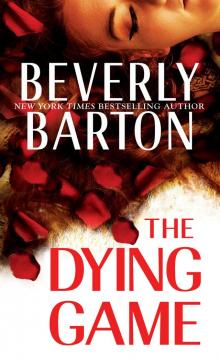 The Dying Game
The Dying Game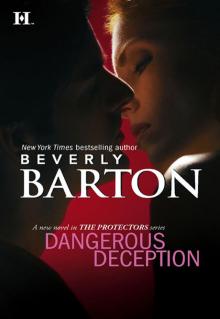 Dangerous Deception
Dangerous Deception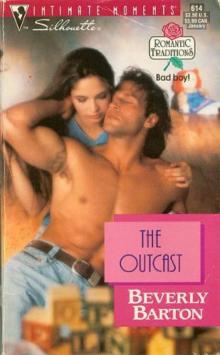 The Outcast tp-3
The Outcast tp-3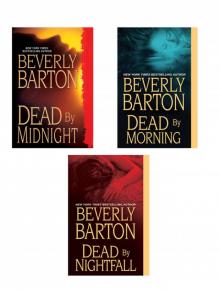 Beverly Barton Bundle
Beverly Barton Bundle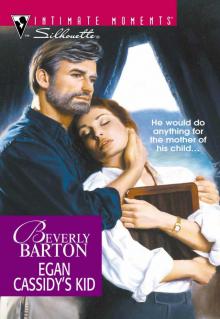 Egan Cassidy's Kid
Egan Cassidy's Kid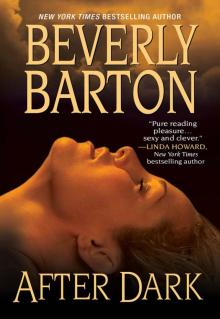 After Dark
After Dark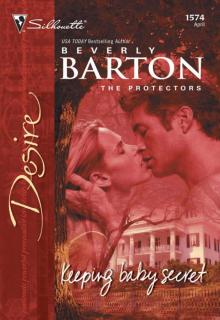 Keeping Baby Secret
Keeping Baby Secret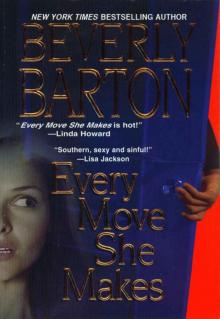 Every Move She Makes
Every Move She Makes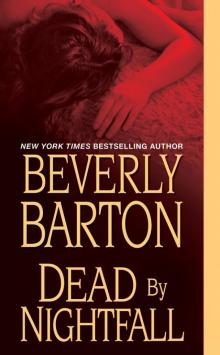 Dead By Nightfall
Dead By Nightfall As Good As Dead (Griffin Powell Book 4)
As Good As Dead (Griffin Powell Book 4)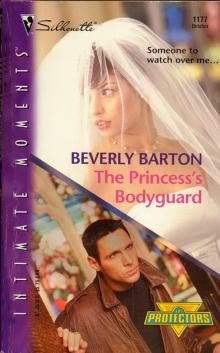 The Princess's Bodyguard
The Princess's Bodyguard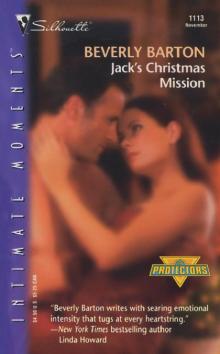 JACK'S CHRISTMAS MISSION
JACK'S CHRISTMAS MISSION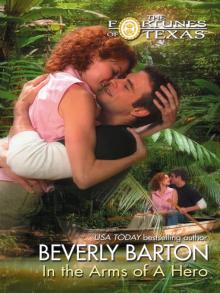 In the Arms of a Hero
In the Arms of a Hero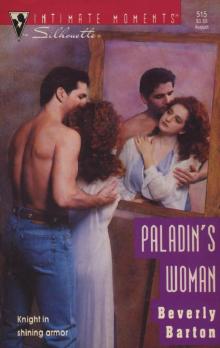 PALADIN'S WOMAN
PALADIN'S WOMAN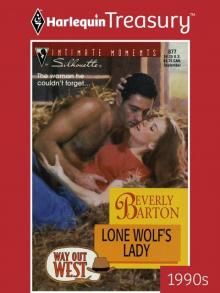 Lone Wolf's Lady
Lone Wolf's Lady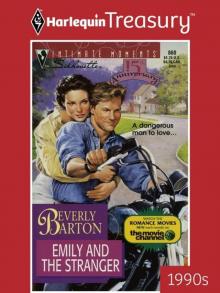 Emily And The Stranger
Emily And The Stranger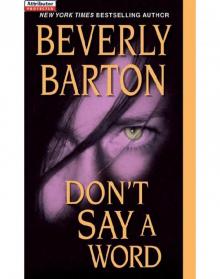 Don't Say a Word
Don't Say a Word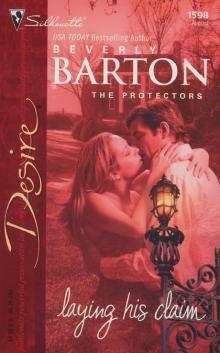 LAYING HIS CLAIM
LAYING HIS CLAIM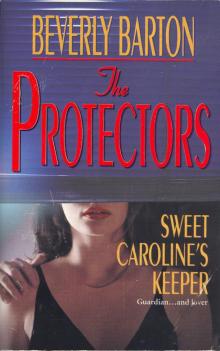 Sweet Caroline's Keeper
Sweet Caroline's Keeper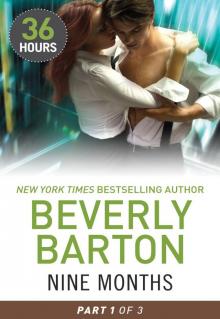 Nine Months Part 1 (36 Hours)
Nine Months Part 1 (36 Hours)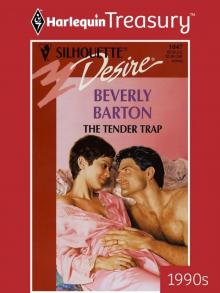 The Tender Trap
The Tender Trap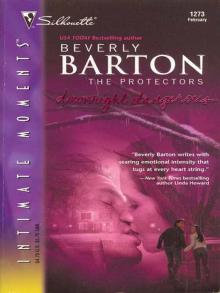 Downright Dangerous
Downright Dangerous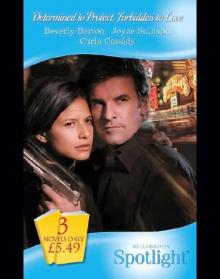 Determined to Protect, Forbidden to Love
Determined to Protect, Forbidden to Love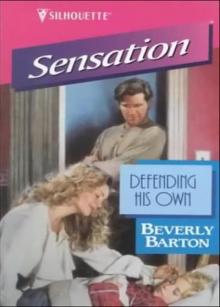 DEFENDING HIS OWN
DEFENDING HIS OWN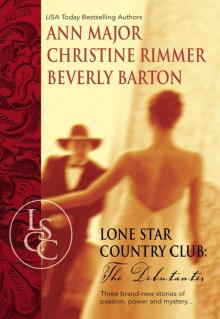 Lone Star Country Club: The Debutantes
Lone Star Country Club: The Debutantes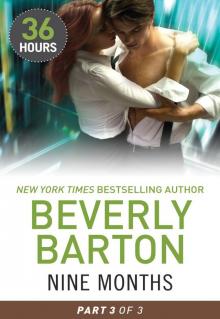 Nine Months Part 3 (36 Hours)
Nine Months Part 3 (36 Hours) Coldhearted
Coldhearted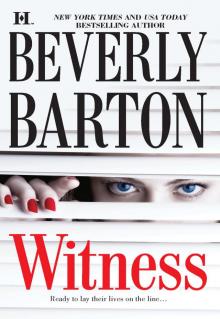 Witness
Witness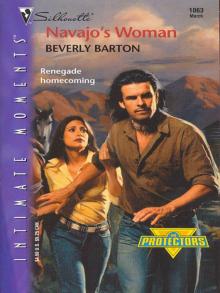 Navajo's Woman
Navajo's Woman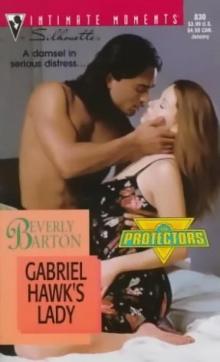 GABRIEL HAWK'S LADY
GABRIEL HAWK'S LADY Faith, Hope and Love
Faith, Hope and Love 12 Stocking Stuffers
12 Stocking Stuffers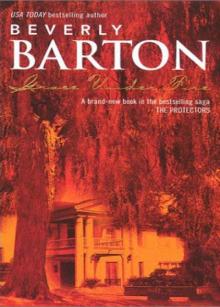 Grace Under Fire
Grace Under Fire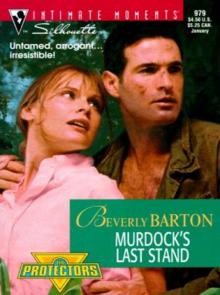 MURDOCK'S LAST STAND
MURDOCK'S LAST STAND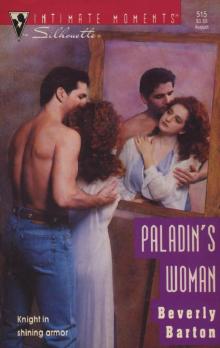 Paladin's Woman tp-2
Paladin's Woman tp-2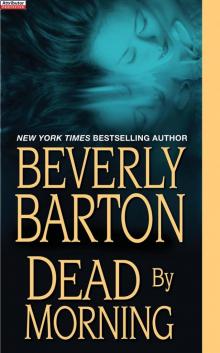 Dead By Morning
Dead By Morning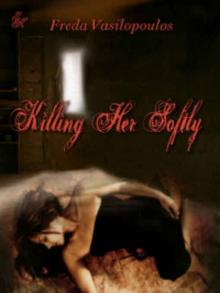 Killing Her Softly
Killing Her Softly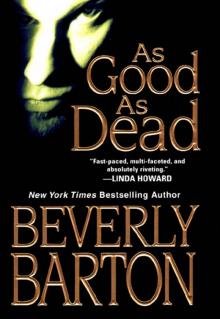 As Good as Dead
As Good as Dead Amnesia
Amnesia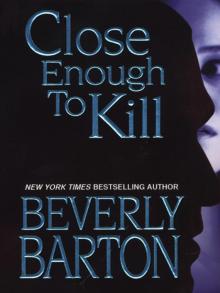 Close Enough to Kill
Close Enough to Kill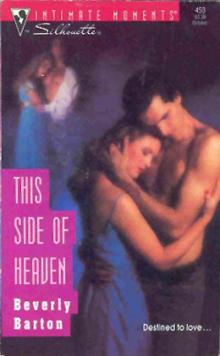 This Side of Heaven tp-1
This Side of Heaven tp-1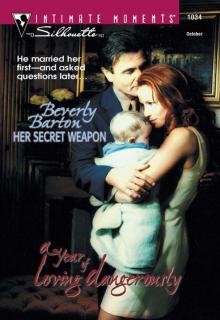 Her Secret Weapon
Her Secret Weapon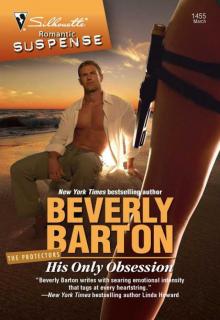 His Only Obsession (Protectors #27)
His Only Obsession (Protectors #27)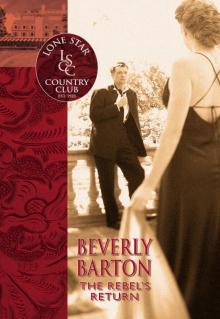 The Rebel's Return
The Rebel's Return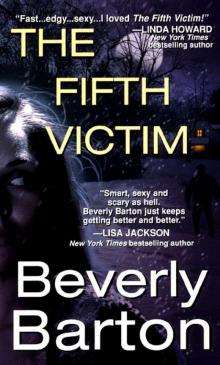 The Fifth Victim
The Fifth Victim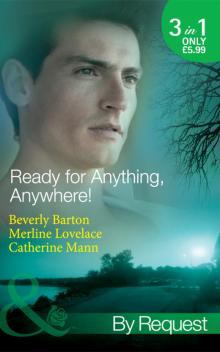 Ready for Anything, Anywhere!
Ready for Anything, Anywhere!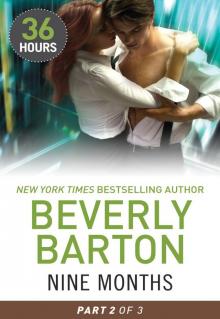 Nine Months Part 2 (36 Hours)
Nine Months Part 2 (36 Hours)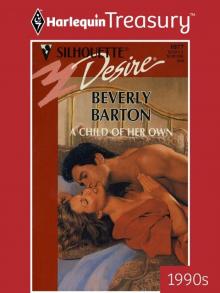 A Child of Her Own
A Child of Her Own Beg to Die
Beg to Die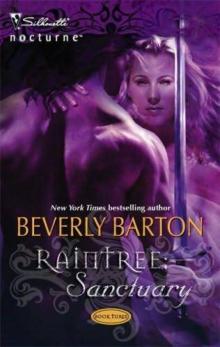 Raintree: Santuary
Raintree: Santuary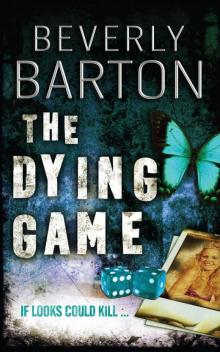 Beverly Barton 3 Book Bundle
Beverly Barton 3 Book Bundle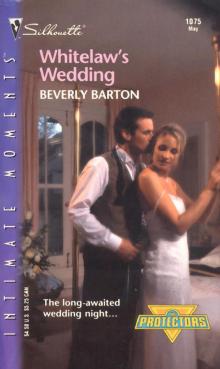 WHITELAW'S WEDDING
WHITELAW'S WEDDING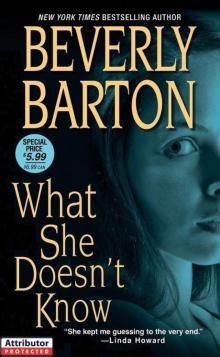 What She Doesn't Know
What She Doesn't Know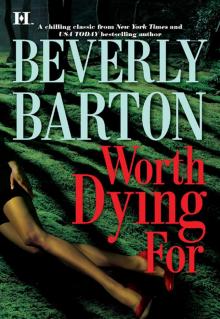 Worth Dying For
Worth Dying For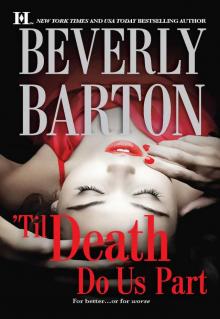 Til Death Do Us Part
Til Death Do Us Part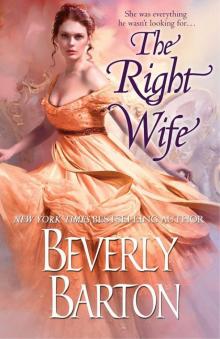 The Right Wife
The Right Wife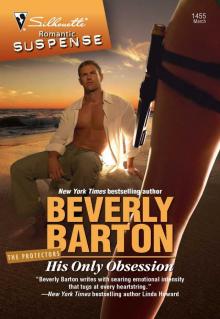 His Only Obsession (Protectors Book 27)
His Only Obsession (Protectors Book 27)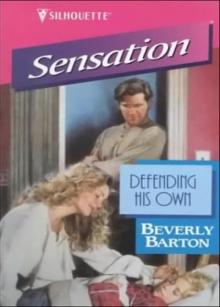 Defending His Own tp-4
Defending His Own tp-4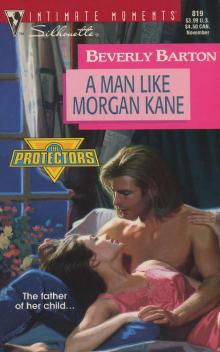 A MAN LIKE MORGAN KANE
A MAN LIKE MORGAN KANE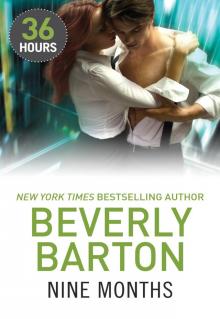 Nine Months
Nine Months If Looks Could Kill
If Looks Could Kill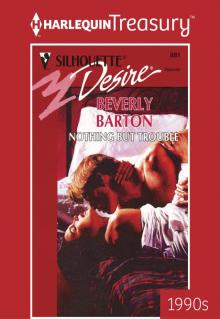 Nothing but Trouble
Nothing but Trouble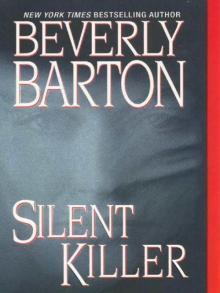 Silent Killer
Silent Killer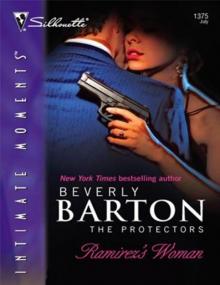 RAMIREZ'S WOMAN
RAMIREZ'S WOMAN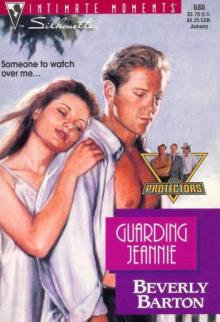 Guarding Jeannie tp-5
Guarding Jeannie tp-5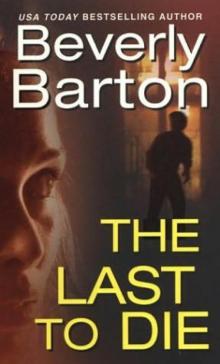 The Last To Die
The Last To Die